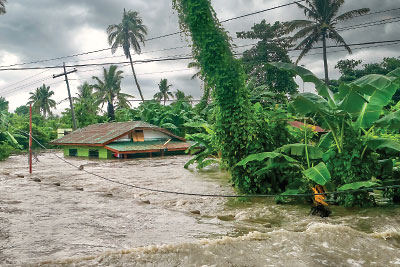The Clock Is Ticking: Are We Prepared for Mass Climate Migration?
Abstract
Over the next several decades, the impact of climate change will force millions of people to leave their homes and seek shelter in other countries. These migrants will require significant mental health support.

The impact of climate change poses a major challenge to peace in the coming decades. As outlined in the Global Peace Index 2019 report, one of the most pressing concerns relates to the growth in climate-induced mass migration. According to a study in the Proceedings of the National Academy of Sciences, the planet could see a greater temperature increase in the next 50 years than it did in the last 6,000 years combined. Should climate-related displacement reach the scale that current research suggests is likely, it will amount to a vast remapping of the world’s populations. As mental health professionals, it is our responsibility to advocate for policies that help guarantee the human rights and well-being of the people affected by this uprooting and the inevitable change in worldwide demographics.
Currently, 1% of the world is considered a barely livable hot zone, but by 2070, nearly a fifth of the land on the planet could hold this designation, from Central America to Sudan to the Mekong Delta. A 2017 study in Science Advances found that by 2100, temperatures could rise to the point that just going outside for a few hours in some places, including parts of India and Eastern China, “will result in death even for the fittest of humans.” The result will almost certainly be the greatest wave of global migration the world has seen. According to The New York Times, more than 30 million migrants could head toward the United States border over the next 30 years.
People are already beginning to flee. In Southeast Asia, where increasingly unpredictable monsoon rainfall and drought have made farming more difficult, the World Bank points to more than 8 million people who have moved toward the Middle East, Europe, and North America. In the African Sahel, millions of rural people have been streaming toward the coasts and the cities amid drought and widespread crop failures.
It is well documented that migration is a highly stressful, traumatic experience that includes potentially deadly situations before, during, and after the movement. As the world’s population shifts in response to climate change, mental health professionals are going to be faced with an increasingly culturally diverse patient population; patients with increased trauma related to migration; acculturation difficulties; and the consequences of migration in the host communities. The literature finds some evidence of poorer mental health and well-being among migrants and displaced populations compared with populations of non-movers in the countries and communities of origin. For example, a cross-national study found that Mexican migrants in the United States had higher levels of depression compared with their counterparts who never left Mexico.
In June 2022, the World Health Organization issued a policy brief highlighting actions for countries to take. It emphasized the serious risk to the mental health and well-being of migrants and urged countries to include mental health support in their responses to the climate crisis. It is our responsibility to use our voices as trusted mental health professionals to advocate for policies that facilitate progressive migration, education that decreases fear, and political resistance to avoid anti-immigration backlash. We must actively prepare, both materially and politically, for climate change and migration to reshape the future. ■
Resources
“Deadly heat waves projected in the densely populated agricultural regions of South Asia”
The World Health Organization’s policy brief: “Mental health and Climate Change: Policy Brief”



